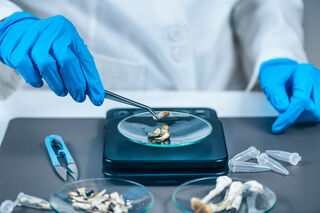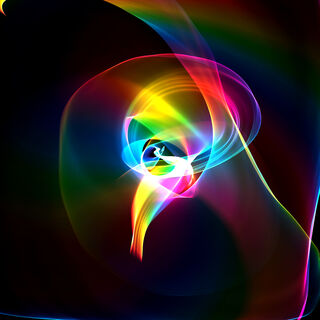Psychedelic-Assisted Therapy
Psilocybin Appears to Make Depressed Brains More Flexible and Fluid
Psilocybin enhances the brain’s dynamic flexibility and fluid connectivity.
Posted April 15, 2022 Reviewed by Tyler Woods
Key points
- Depression is marked by rut-like ruminative thinking, rigid neural networks, and brain connectivity that isn't fluid or flexible.
- Psilocybin decreases brain modularity (i.e., rigid segregation) and increases the "global integration" of multiple neural networks.
- Psilocybin-induced "dynamic flexibility" helps people with treatment-resistant depression in ways that traditional antidepressants don't.

Medical review by Daniel Miller, M.D.
Psilocybin, the active ingredient in psychedelic "magic mushrooms," shows promise as a new clinical tool for helping people with treatment-resistant depression (TRD) or major depressive disorders who don't respond to traditional antidepressants such as selective serotonin reuptake inhibitors (SSRIs).
The latest trials (Daws et al., 2022) led by researchers at the UK-based Centre for Psychedelic Research suggest that psilocybin exerts its therapeutic effects on the clinically depressed brain by making functional connectivity between different neural networks more fluid and flexible. These findings were published on April 11 in the peer-reviewed journal Nature Medicine.
"Psilocybin works differently from conventional antidepressants [by] making the brain more flexible and fluid and less entrenched in the negative thinking patterns associated with depression," David Nutt, current Head of Imperial's Centre for Psychedelic Research, said in an April 2022 news release.
According to the authors, brain activity patterns in people with major depressive disorders often become "rigid and restricted." Their fMRI-based research suggests that psilocybin helps a clinically depressed person's brain "break out of this rut" in ways that traditional antidepressants don't.
What Is Dynamic Flexibility?
Sometimes, during functional magnetic resonance imaging (fMRI) brain scans, a metric known as "dynamic flexibility" is used to index how frequently different brain regions change their neural "community of allegiance" while someone's inside the scanner.
Higher degrees of dynamic flexibility within the brain are associated with less segregation (i.e., modularity) between various neural networks and more extensive global integration between brain regions within the so-called "cranial globe."
Previous research and meta-analyses (Goodman et al., 2021) into whole-brain functional dynamics and depressive symptomatology identified a link between dynamic flexibility and depression severity. Less dynamic flexibility is linked to more severe depression. On the flip side, higher degrees of dynamic flexibility are associated with fewer depressive symptoms.
Notably, increases in depressive symptom severity seem to be associated with longer "dwell time" in the default mode network (DMN), which perpetuates self-focused thoughts and depressive rumination in major depressive disorder (Hamilton et al., 2015).
A lack of dynamic flexibility in people with treatment-resistant depression seems to inhibit the global integration of hybrid brain networks, which keeps people stuck in a rut of depressive rumination.
The Depressed Brain Is Rigid and Lacks Dynamic Flexibility
In recent years, Robin Carhart-Harris and colleagues at Imperial College London's Centre for Psychedelic Research have established (Carhart-Harris et al., 2017) that administering 10-25 milligram doses of psilocybin in a well-supervised clinical setting helps to "reset" brain circuitry and reduces depressive symptoms in people with major depressive disorder (MDD) or TRD. (See, "Psilocybin May 'Reset' Brain Circuitry of Depressed Patients.")
Since March 2021, Carhart-Harris has been Director of the U.S.-based Neuroscape Psychedelics Division at the University of California, San Francisco (UCSF).
Despite international advances in clinical research, scientists still aren't exactly sure how psilocybin and other psychedelics (e.g., LSD, mescaline) that target serotonin 5-HT2A receptors actually "reboot" or "reset" someone's neural frameworks.
That said, accumulating fMRI-based evidence suggests that psilocybin facilitates the desegregation of rigidly compartmentalized neural networks and "opens up" the depressed brain by enhancing dynamic flexibility and increasing global integration, which disrupts the vicious cycle of self-focused depressive rumination.

Psilocybin Makes the Brain Less Rigid
For their latest (2022) paper, first author Richard Daws, senior authors Carhart-Harris and Dunn, and their colleagues analyzed fMRI brain scans of 59 participants with TRD or MDD in two very different studies.
"In both trials, the antidepressant response to psilocybin was rapid, sustained, and correlated with decreases in fMRI brain network modularity, implying that psilocybin's antidepressant action may depend on a global increase in brain network integration," Daws et al. explain in their paper's abstract.
Study One was an open-label clinical trial. For this fMRI-based study, 16 participants with TRD were given two oral doses of psilocybin (10mg and 25mg) seven days apart. They had an fMRI brain scan at baseline and one day after the 25 mg dose.
In this study, psilocybin therapy was associated with significantly reduced Beck Depression Inventory (BDI) scores six months after treatment. Additionally, decreased network modularity and increased global integration one day after the final psilocybin treatment correlated with better BDI scores six months later.
Study Two was a randomized, double-blind clinical trial that compared psilocybin treatment to a traditional SSRI in a total of 43 people (21 in the "SSRI arm" and 22 in the "psilocybin arm") who'd been diagnosed with major depressive disorder.
Participants in this study's "psilocybin arm" were given two 25 mg oral doses of psilocybin three weeks apart and took a daily placebo-filled capsule for six weeks. Those in the "SSRI-arm" were given two 1 mg oral doses of psilocybin three weeks apart and ingested a 10-20 mg escitalopram (Lexapro) capsule every day for six weeks. All participants had their brain network modularity and dynamic flexibility measured at baseline and after six weeks using fMRI neuroimaging.
In Study Two, those in the "psilocybin arm" experienced a more significant reduction in depressive symptoms than those in the "SSRI arm." Markedly reduced depressive symptoms observed in this study's psilocybin arm at the six-week endpoint were correlated with decreased modularity between neural networks and increased global integration.
Based on the findings of these two trials, the authors conclude: "Consistent efficacy-related brain changes, correlating with robust antidepressant effects across two studies, suggest an antidepressant mechanism for psilocybin therapy: global increases in brain network integration.
"In previous studies, we had seen a similar effect in the brain when people were scanned whilst on a psychedelic, but here we're seeing it weeks after treatment for depression, which suggests a 'carry over' of the acute drug action," Carhartt-Harris explained in a news release.
"We don't yet know how long the changes in brain activity seen with psilocybin therapy last, and we need to do more research to understand this," he added. "We do know that some people relapse, and it may be that after a while, their brains revert to the rigid patterns of activity we see in depression."
Interestingly, other recent fMRI-based studies (Anderson et al., 2022; Ovando-Tellez et al., 2022; McAfee et al., 2022) into creativity and divergent thinking have unearthed previously unknown upsides of optimizing fluid whole-brain connectivity and decreasing the modularity of segregated neural networks by encouraging people to take the "road less traveled" in their minds. (See, "Creativity Flourishes Away From Beaten Pathways in the Mind.")
Caution: Do Not Self-Medicate with Psychedelics
The regulated dosage of psilocybin used during psychedelic-assisted therapy is formulated in a laboratory and administered by mental health professionals who offer extensive psychological support before, during, and after someone takes a hallucinogenic dose of "magic mushrooms."
Psychedelic researchers warn against people with depression attempting to self-medicate by ingesting psilocybin or other hallucinogens outside a clinical setting. Many safeguards are taken during clinical trials involving psilocybin and other psychedelics to increase the odds of positive outcomes and lower the risk of someone having a "bad trip." Although one mystical psychedelic trip can have lifelong benefits, there are always risks associated with using mind-altering substances.
References
Richard E. Daws, Christopher Timmermann, Bruna Giribaldi, James D. Sexton, Matthew B. Wall, David Erritzoe, Leor Roseman, David Nutt & Robin Carhart-Harris. "Increased Global Integration in the Brain After Psilocybin Therapy for Depression." Nature Medicine (First published: April 11, 2022) DOI: 10.1038/s41591-022-01744-z
Robin Carhart-Harris, Leor Roseman, Mark Bolstridge, Lysia Demetriou, J Nienke Pannekoek, Matthew B. Wall, Mark Tanner, Mendel Kaelen, John McGonigle, Kevin Murphy, Robert Leech, H. Valerie Curran, and David J. Nutt. "Psilocybin for Treatment-Resistant Depression: fMRI-Measured Brain Mechanisms." Scientific Reports (First published: October 13, 2017) DOI: 10.1038/s41598-017-13282-7
Zachary T. Goodman, Sierra A. Bainter, Salome Kornfeld, Catie Chang, Jason S. Nomi, Lucina Q. Uddin. "Whole-Brain Functional Dynamics Track Depressive Symptom Severity." Cerebral Cortex (First published: March 29, 2021) DOI: 10.1093/cercor/bhab047
J. Paul Hamilton Madison Farmer Phoebe Fogelman Ian H. Gotlib. "Depressive Rumination, the Default-Mode Network, and the Dark Matter of Clinical Neuroscience." Biological Psychiatry (First published: February 24, 2015) DOI: 10.1016/j.biopsych.2015.02.020
Ariana Anderson, Kevin Japardi, Kendra S. Knudsen, Susan Y. Bookheimer, Dara G. Ghahremani, Robert M. Bilder. "Big-C Creativity in Artists and Scientists Is Associated with More Random Global but Less Random Local fMRI Functional Connectivity." Psychology of Aesthetics, Creativity, and the Arts (First published online: March 28, 2022) DOI: 10.1037/aca0000463
Marcela Ovando-Tellez, Yoed N. Kenett, Mathias Benedek, Matthieu Bernard, Joan Belo, Benoit Beranger, Theophile Bieth, Emmanuelle Volle. "Brain Connectivity–Based Prediction of Real-Life Creativity Is Mediated by Semantic Memory Structure." Science Advances (First published: February 04, 2022) DOI: 10.1126/sciadv.abl4294
Samuel S. McAfee, Yu Liu, Roy V. Sillitoe, and Detlef H. Heck. "Cerebellar Coordination of Neuronal Communication in Cerebral Cortex." Frontiers in Systems Neuroscience (First published: January 11, 2022) DOI: 10.3389/fnsys.2021.781527




